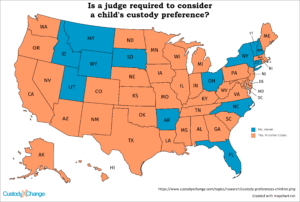
In 2024, child custody laws are undergoing significant changes that could impact families across the globe. For parents and guardians, understanding these changes is crucial to navigating the complexities of custody cases and ensuring the best possible outcomes for their children. This article will provide a comprehensive overview of the recent legal changes in child custody rights, how these modifications might affect your case, and essential tips for adapting to the evolving legal landscape.
Understanding Child Custody Rights
Child custody refers to the legal rights and responsibilities a parent or guardian has regarding the care, control, and upbringing of a child. Custody arrangements typically fall into two main categories: physical custody and legal custody.
- Physical custody refers to where the child lives and who is responsible for their day-to-day care.
- Legal custody involves the right to make significant decisions about the child’s life, including education, healthcare, and religious upbringing.
Custody can be awarded solely to one parent (sole custody) or shared between both parents (joint custody). Courts aim to make decisions that are in the best interest of the child, considering factors such as the child’s safety, emotional well-being, and the ability of each parent to provide a stable environment.
Key Changes in Child Custody Laws in 2024
Several key changes have been introduced to child custody laws in 2024, reflecting evolving societal norms and the latest research on child development. These changes aim to prioritize the welfare of the child while also acknowledging the rights of both parents. Here are some of the most significant modifications:
1. Increased Focus on Co-Parenting
One of the most notable changes in 2024 is the increased emphasis on co-parenting. Courts are now more inclined to encourage arrangements where both parents are actively involved in the child’s life. This shift is based on research suggesting that children benefit from having both parents involved, provided the environment is healthy and free from conflict.
2. Expanded Definitions of Parental Roles
The definition of what constitutes a “parent” has expanded. In addition to biological parents, courts are now recognizing the rights of stepparents, grandparents, and other significant caregivers in the child’s life. This change acknowledges the diversity of modern families and the different forms that parental support can take.
3. Consideration of the Child’s Voice
Another important change is the increased consideration of the child’s preferences in custody cases. For older children and teenagers, their wishes are being given more weight, particularly if they demonstrate maturity and understanding of the situation. This change empowers children and ensures that their voices are heard in decisions that directly affect their lives.
4. Updated Criteria for Best Interest of the Child
The criteria for determining the “best interest of the child” have been updated to include a broader range of factors. These now encompass the mental and emotional health of the parents, the child’s adjustment to home and school, and the ability of each parent to foster a positive relationship between the child and the other parent. This holistic approach aims to create a more comprehensive evaluation of what is truly best for the child.
5. Enhanced Protections Against Parental Alienation
New laws in 2024 also provide enhanced protections against parental alienation, where one parent attempts to negatively influence the child’s perception of the other parent. Courts are now more vigilant in identifying and addressing these behaviors, ensuring that custody decisions are not based on manipulated or coerced testimony from children.
How These Changes May Affect Your Case
Understanding how these legal changes might impact your custody case is essential for parents navigating the system in 2024. Here are some potential effects:
1. Greater Emphasis on Shared Custody Arrangements
With the legal shift towards co-parenting, parents seeking sole custody may face more challenges unless they can demonstrate that shared custody would not be in the child’s best interest. If you are pursuing sole custody, it is vital to be prepared to provide substantial evidence supporting your case.
2. Broader Inclusion of Non-Biological Parents
If you are a stepparent, grandparent, or another caregiver, you may have a stronger legal standing in custody cases due to the expanded definitions of parental roles. This could be particularly relevant in cases where the biological parents are unable or unwilling to provide care.
3. Increased Importance of the Child’s Perspective
For parents of older children, understanding and respecting their child’s wishes is more crucial than ever. Courts are more likely to consider a child’s expressed desires, so facilitating an environment where your child feels comfortable sharing their thoughts can be beneficial.
4. Holistic Evaluation of Parental Fitness
The updated criteria for evaluating the best interest of the child mean that parents need to present a well-rounded picture of their ability to provide a supportive environment. This includes demonstrating mental and emotional stability, the ability to co-parent effectively, and a commitment to fostering a positive relationship with the other parent.
5. Vigilance Against Parental Alienation
With stricter rules against parental alienation, parents should be cautious about any behavior that could be interpreted as attempting to manipulate their child’s view of the other parent. Maintaining a positive, respectful attitude towards your co-parent in front of your child is crucial.
Tips for Navigating Child Custody Changes in 2024
Adapting to these legal changes requires preparation and a proactive approach. Here are some tips to help you navigate the evolving landscape of child custody:
- Seek Legal Advice Early: Consulting with a family law attorney who is up-to-date on the latest changes can provide invaluable guidance tailored to your specific situation.
- Focus on Co-Parenting: If possible, work towards a co-parenting arrangement. Courts are increasingly favoring these setups, and showing a willingness to cooperate with the other parent can strengthen your case.
- Document Everything: Keep detailed records of all interactions with your co-parent, including communications, agreements, and any instances of conflict or cooperation. This documentation can be crucial in court.
- Stay Child-Focused: Always prioritize the well-being of your child in all decisions and actions. Courts are more likely to favor parents who clearly demonstrate that their primary concern is the child’s best interest.
- Avoid Negative Talk: Refrain from speaking negatively about the other parent in front of your child. Not only can this harm your relationship with your child, but it can also be seen as an attempt at parental alienation.
- Be Open to Mediation: Mediation can be an effective way to resolve disputes without going to court. It allows for more flexibility and can result in a more amicable agreement that benefits everyone involved, especially the child.
Conclusion
The changes to child custody laws in 2024 reflect a significant shift towards more inclusive and child-centered practices. By understanding these new laws and preparing accordingly, parents and guardians can better navigate the legal system and work towards outcomes that prioritize the well-being of their children. Whether you are seeking custody or trying to modify an existing arrangement, staying informed and adaptable is key to achieving the best possible results for your family.




